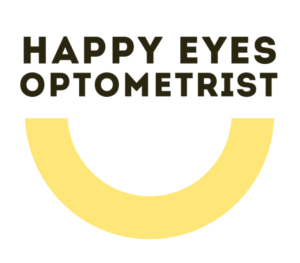Early detection can protect your central vision
Age-related Macular Degeneration (AMD) affects the macula—the part of the retina responsible for sharp, central vision used for reading, driving, and recognising faces. AMD often starts silently, so regular eye tests are essential. With the right care, much sight loss is preventable.
Symptoms & signs to watch for
- Blurred or distorted central vision (straight lines look wavy)
- Dark/empty patch in the centre of sight
- Colours appear faded
- Difficulty with reading, faces, or low-light tasks
- Increasing need for brighter light
If you notice sudden distortion or a central dark spot, book urgently.

Why early detection matters
AMD can progress from early → intermediate → advanced (dry or wet).
Detecting changes early allows timely treatment or protective steps that can slow progression and help preserve central vision.

How we check your macula at Happy Eyes
- OCT scanning (Optical Coherence Tomography): High-resolution cross-section images to detect drusen, fluid, and subtle structural changes. We compare scans year-on-year to track trends.
- Amsler chart monitoring: A simple grid test to detect new distortion at home between reviews.
- Dilated fundus examination & retinal photos: To thoroughly assess the macula and document change over time.
- Risk review: Family history, smoking, UV exposure, cardiovascular factors, and nutrition.
AREDS2: evidence-based nutritional support
AREDS2 is a clinically studied supplement formula for intermediate AMD or advanced AMD in one eye. It does not cure AMD, but it can reduce the risk of progression in eligible patients.
Typical AREDS2 components:
- Lutein & Zeaxanthin (replace beta-carotene)
- Vitamin C & Vitamin E
- Zinc (with Copper to prevent deficiency)
Who may benefit:
Patients diagnosed with intermediate AMD or those with advanced AMD in one eye (your optometrist will advise).
Important notes:
- Not a substitute for a healthy diet (leafy greens, colourful veg, fish) and smoking cessation.
- Check with your GP about interactions (e.g., other supplements, anticoagulants).
- Smokers/former smokers should avoid beta-carotene formulations—AREDS2 (without beta-carotene) is preferred.
Dry vs Wet AMD (in brief)
- Dry (atrophic): Gradual thinning of the macula; more common.
- Wet (neovascular): Fragile new vessels leak fluid/blood—sudden distortion or rapid vision change. Wet AMD needs urgent ophthalmology treatment (e.g., anti-VEGF injections).
We’ll coordinate rapid referral when needed and continue shared monitoring.
At-home Amsler chart check (weekly)
- Wear your usual reading glasses.
- Hold the chart at reading distance in good light.
- Cover one eye, look at the central dot; repeat with the other eye.
- If lines look wavy, broken, or a patch is missing, contact us promptly.
We can provide a printed chart or a digital version.
Protecting your macula: daily habits
- Don’t smoke (biggest modifiable risk)
- UV protection: Quality sunglasses & hats outdoors
- Nutrition: Leafy greens, colourful fruit/veg, omega-3 rich fish
- Manage health: Blood pressure, cholesterol, and exercise
- Keep regular macula checks—even without symptoms
What to expect at your visit
- Vision & symptoms review
- Dilated exam, retinal photos, and OCT scan
- Personalised plan: AREDS2 suitability, lifestyle guidance, and review schedule
- Monitoring: Year-on-year OCT comparison and Amsler use between visits
